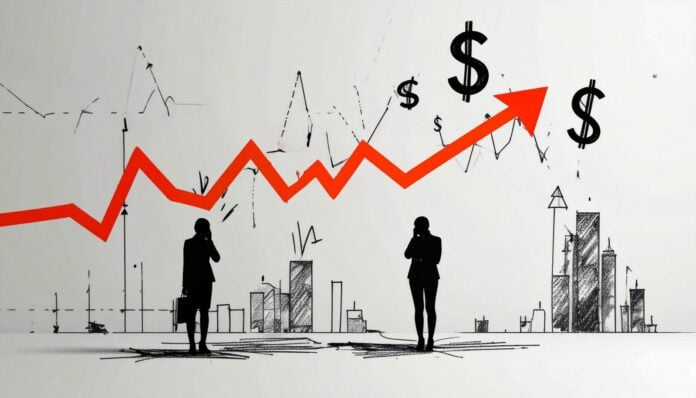When a stock begins trending – whether through media coverage, viral social media posts, or a surge in online search activity – it often attracts a wave of retail investors and, in turn, a bump in share price. But as interest rises, so do opportunities for those on the inside.
A new study from Virginia Tech’s Pamplin College of Business reveals that corporate executives frequently time their stock trades around spikes in investor attention. The research, led by Sattar Mansi, Wells Fargo Professor of Finance, finds that insiders are significantly more likely to sell shares when public interest in their company is high and to buy shares when that attention wanes –capturing value from short-term market sentiment, rather than long-term company performance.
“We found that insiders aren’t just responding to fundamentals,” Mansi said. “They’re watching when investors are paying attention – and that’s when they choose to sell.”
The findings, published in the Journal of Financial and Quantitative Analysis, provide new insights into how behavioral patterns in the market influence trading by those with privileged access – not to confidential information, but to timing.
Retail attention as a trading signal
Mansi and his co-authors analyzed thousands of insider trades across publicly traded companies from 2014 to 2020, using Google search volume as a proxy for investor attention. The data showed a clear trend: insiders systematically sold shares during periods of heightened retail interest, and repurchased shares once attention declined.
Unlike traditional insider trading, which is illegal and involves material non-public information, this form of trading operates in a legal gray area. Because the strategy relies on public signals – rather than private data – it falls outside the scope of most regulatory oversight.
“Insiders are using public attention as a signal,” Mansi said. “It’s completely legal under current rules, but it raises important questions about market dynamics and fairness.”
A shifting landscape of investor influence
The research was motivated in part by the changing role of retail investors in financial markets. Historically, individual traders had limited influence on prices and little access to information. But Mansi said that’s no longer the case.
“Retail investors used to be considered noise traders, not market movers,” Mansi said. “But with the rise of fintech platforms and online forums, their activity has become more visible, more coordinated, and more impactful.”
That shift has created a new kind of opportunity for company insiders. With traditional insider trading tightly regulated by the Securities and Exchange Commission (SEC), executives are increasingly turning to behavioral cues – such as investor attention – as a legal and effective alternative.
“This is not about breaking the law,” Mansi said. “It’s about finding another way to trade advantageously – by using publicly available information in a way that most investors don’t.”
The most vulnerable stocks: ‘Lottery-type’ shares
The study found this behavior was most prevalent in so-called “lottery-type” stocks – highly speculative shares characterized by low prices, high volatility, and the remote possibility of oversized returns. These stocks often attract the attention of retail investors hoping for a big win, but they also present outsized risks.
“These are stocks that behave like lottery tickets,” Mansi explained. “They attract investors chasing quick gains, often driven by momentum and social media hype. Insiders recognize that and sell into that attention.”
Compared to larger, more stable companies, insiders at these speculative firms were nearly twice as likely to time their trades around attention spikes.
Market signals, not misdeeds
Although this strategy falls within the bounds of the law, Mansi said the findings still highlight potential gaps in how market behavior is regulated and understood.
“The SEC is focused on trades involving non-public information, which is important,” Mansi said. “But this study shows there are other ways insiders can gain an edge – ones that are harder to detect, and harder to regulate.”
Still, Mansi does not advocate for new rules – at least not yet. Instead, he believes market awareness could be the most effective tool in addressing the imbalance.
“This is why we conducted the research,” Mansi said. “By making these patterns more visible, we hope the market itself will adjust. If investors know what to look for, they can respond accordingly.”
What investors can do
Mansi encourages individual investors to pay attention not only to a company’s hype – but to its insider trading reports. Executives are legally required to file their transactions with the SEC within two business days, and those disclosures are publicly available.
“Retail investors should learn to read those filings,” he said. “If a stock is getting a lot of attention and insiders are selling at the same time, that’s a signal worth paying attention to.”
Future directions
Mansi and his colleagues plan to continue investigating how different forms of investor attention – not just from retail traders, but from institutional investors – affect insider behavior.
“There’s more to explore here,” Mansi said. “We want to understand whether insiders respond differently when attention comes from long-term investors versus short-term speculators. The dynamics are changing fast, and we need to keep up.”
As financial markets continue to evolve, Mansi believes the distinction between legal trading and ethical practice will become increasingly important – for investors, regulators, and the companies themselves.
“This research isn’t just about trading. It’s about understanding how behavior shapes markets – and what that means for trust, transparency, and fairness in the long run,” Mansi said.
Mansi was joined on the study by Lin Peng, the Krell Chair Professor of Finance at the Zicklin School of Business, Baruch College, City University of New York; Jianping Qi, professor at the Muma College of Business, University of South Florida; and Han Shi, assistant professor at the School of Business, Louisiana State University Shreveport.
By Whitney Slightham


